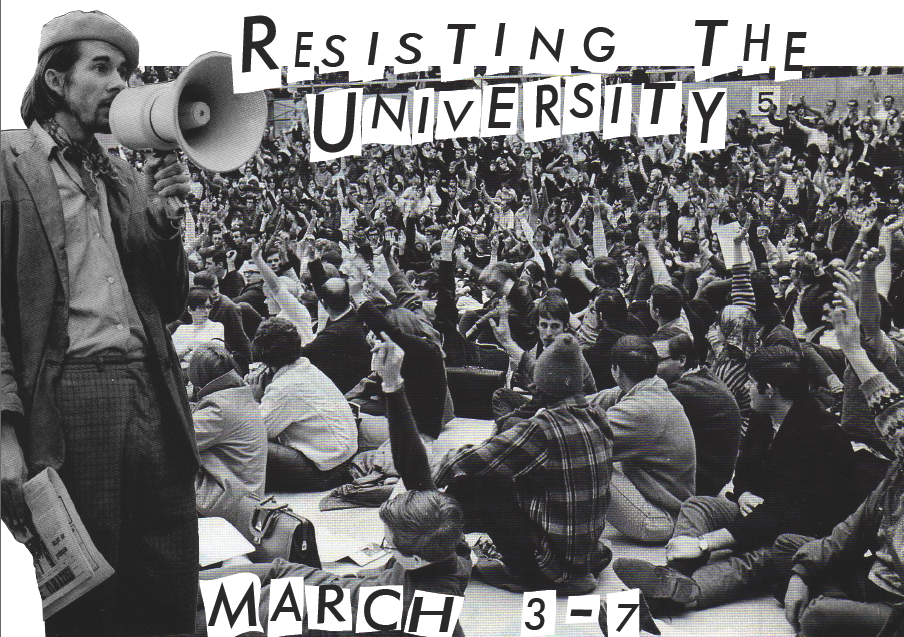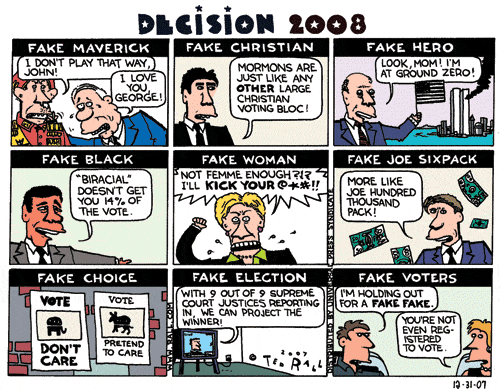
The Onion News Network: Obama, Clinton, McCain Join Forces To Form Nightmare Ticket
Category Archives: Democracy
“You don’t care what the American people think?”
“You don’t care what the American people think?”
http://www.salon.com/ politics/ war_room/ 2008/ 03/ 19/ cheney/ index.html?source=rss&a…
Vice President Dick Cheney appeared — from Oman — on “Good Morning America” Wednesday. During Cheney’s appearance, ABC News correspondent Martha Raddatz mentioned public opinion polls on the war in Iraq. Here’s the conversation that ensued, including Raddatz’s original comment. Video of the exchange follows. RADDATZ: Two-thirds of Americans say it’s not worth fighting. CHENEY: So. RADDATZ: So? You don’t care what the American people think? CHENEY: No. I think you cannot be blown off course by the fluctuations in the public opinion polls. There has in fact been fundamental change and transformation and improvement for the better.
Diebold accidentally leaks results of 2008 election early
Resisting the University (Conference at UBC March 3-7, 2008)

SDS – UBC is hosting a Week of Resistance! We’ll be discussing the privatization and commodification of education with an anti-military, anti-gentrification and direct-action bent! Join us if you’re a student activist, a wanna-be student activist or simply intrigued by student activism and open to learn more about it! This conference is open to everyone as the issues explored are consequential for society at large.
email sds.ubc@gmail.com to get involved.
bookface group: http://ubc.facebook.com/event.php?eid=20667840135&ref=nf
SCHEDULEOF EVENTS:
MONDAY:
12-2 p.m. — Opening Ceremony:
Keynote: DAVID NOBLE – “From Whining to Winning: Winning the Battle with the University—Dummy Corporations and all!”
David Noble is one of Canada’s most famous professor-activists. He’s currently a history professor at York University. He’s flying all the way out here to share his experiences fighting the Corporate University – and winning!
5-7 p.m. — “Military-free UBC” panel
SDS Tacoma, UVIC anti-military recruiters and more discussing anti-military strategies on campus and what you can do about it!
TUESDAY:
12-2 p.m. — “Labour and Corporatization of Campus” panel
The issue of rising sessesional instructors, the connection between labor and race and the CocaCola bastards on campus will be addressed all in one sitting!
Presenters: Petra Ganzenmueller (sessional instructor—CAUT); Larry Ngoma (CUPE and issues of racism); Stefanie Ratjen, AMS VP external elect (tuition fee increases); Steven Klein, SDS (history of Coca-cola contracts on campus).
More to Come!
WEDNESDAY:
12-2 p.m. — “Unschooling Oppression” panel
Alternative models of education will be explored!
Presenters: Representatives from colour school, Indigenous free school, Windsor House, Bruce Baum.
5-7 p.m. –“Deconstructing ‘Progress’: Housing, Gentrification and Olympic Resistance” panel
No to the gentrification of the University/City!
Presenters: Gord Hill (No 2010 coalition), professor Chris Shaw (2010 Watch), Margaret Orlowski (Students for a Democratic Society), and Tom Malenfant (Anti-Poverty Committee)
THURSDAY:
12-2 p.m. – “Demystifying the Power Structure at UBC” panel + Lunch
Ever wondered what the fuck the AMS, BoG, Student Council, Resource Groups, GSS, AUS, and billions of other acronyms stand for? This is a student-directed workshop aimed at unmasking the power structure at UBC! Shit you actually need to know if you are a UBC student.
Lunch Will be Served!
5-7 p.m. — “History of Activism at the University” panel
Come listen to UBC and SFU activists from the APEC period and before! Let’s integrate the older narratives with the new ones and make the interconnections. Awesome workshop for any current or wanna-be activist!
FRIDAY:
12-2 p.m. March in solidarity for International Women’s day!
3-5 p.m. — Closing Keynote: DENIS RANCOURT – “Anarchism in Academia Now!”
Radical professors are needed to indoctrinate progressive students. Anarchist professors are needed to make sanity. If they’re not trying to stop you, then you’re not making a difference.
Denis G. Rancourt is a physics professor, environmental researcher, activist, and anarchist teaching at the University of Toronto.
http://www.science.uottawa.ca/~dgr/
7-11pm — RHIZOME CAFé (317 East Broadway)
Fundraiser, celebration of student art, music and resistance; entrance by donation
Full list of panel speakers and more activities on the way!
Poverty Olympics prosper on $6 budget
From NowPublic.com: Poverty Olympics prosper on $6 budget
The Poverty Olympics, a satirical event meant to bring awareness to Vancouver’s poverty issues, took place Sunday afternoon in front of Carnegie Theatre on Vancouver’s Downtown Eastside.
While the 2010 Winter Olympics has a budget of about $6-billion, the poverty-focussed counterpart cost six bucks, according to organizers. Mascots were a giant rat and cockroach.
(Fake) Election 2008

Police in thought pursuit
The Washington Times: Police in thought pursuit
December 27, 2007
By Bruce Fein – The Pope had his Index of Forbidden Books. Japan had its Thought Police against subversive or dangerous ideologies. And the United States Congress and President Bush have learned nothing from those examples.
Congress is perched to enact the “Violent Radicalization and Homegrown Terrorism Prevention Act of 20007 (Act),” probably the greatest assault on free speech and association in the United States since the 1938 creation of the House Un-American Activities Committee (HUAC). Sponsored by Rep. Jane Harman, California Democrat, the bill passed the House of Representatives on Oct. 23 by a 404-6 vote under a rule suspension that curtailed debate. To borrow from House Speaker Nancy Pelosi, California Democrat, the First Amendment should not distract Congress from doing important business. The Senate companion bill (S. 1959), sponsored by Susan Collins, Maine Republican, has encountered little opposition. Especially in an election year, senators crave every opportunity to appear tough on terrorism. Few if any care about or understand either freedom of expression or the Thought Police dangers of S. 1959. Former President John Quincy Adams presciently lamented: “Democracy has no forefathers, it looks to no posterity, it is swallowed up in the present and thinks of nothing but itself.”
Denuded of euphemisms and code words, the Act aims to identify and stigmatize persons and groups who hold thoughts the government decrees correlate with homegrown terrorism, for example, opposition to the Patriot Act or the suspension of the Great Writ of habeas corpus.
The Act will inexorably culminate in a government listing of homegrown terrorists or terrorist organizations without due process; a complementary listing of books, videos, or ideas that ostensibly further “violent radicalization;” and a blacklisting of persons who have intersected with either list.
Political discourse will be chilled and needed challenges to conventional wisdom will flag. There are no better examples of sinister congressional folly.
The Act inflates the danger of homegrown terrorism manifold to justify creating a marquee National Commission on the Prevention of Violent Radicalization and Ideologically Based Violence (Commission) in the legislative branch. Since September 11, 2001, no American has died from homegrown terrorism, while about 120,000 have been murdered.
In the so-called post-September 11 “war” against international terrorism, Mr. Bush has detained only two citizens as enemy combatants. One was voluntarily deported to Saudi Arabia; the other was indicted, tried and convicted in a civilian court of providing material assistance to a foreign terrorist organization. And employing customary law enforcement tools, the United States has successfully prosecuted several pre-embryonic terrorism conspiracies amidst numerous false starts.
Prior to September 11, homegrown terrorism consisted largely of Timothy McVeigh, Eric Rudolph, the Unibomber and the D.C. Metropolitan area snipers. The Act, nevertheless, counterfactually finds “homegrown terrorism … poses a threat to domestic security” that “cannot be easily prevented through traditional federal intelligence or law enforcement efforts.”
Twelve members of the commission will be appointed by the president and leaders in the House and Senate. They will predictably serve the political needs of their political masters.
The commission’s Big Brother task is to discover ideas and political associations, including connections to non-U.S. persons and networks, that promote “violent radicalization, homegrown terrorism, and ideologically based violence in the United States.” And “violent radicalization” is defined as “the process of adopting or promoting an extremist belief system for the purpose of ideologically based violence to advance political, religious, or social change.”
Under the Act, William Lloyd Garrison would have been guilty of promoting “violent radicalization” for publishing the anti-slavery Liberator in 1831, which “facilitated” John Brown. Susan B. Anthony and Elizabeth Cady Stanton would have been condemned for assailing laws disenfranchising women and creating an intellectual atmosphere receptive to violence. And Martin Luther King, Jr. would have fallen under the Act’s suspicion for denouncing Jim Crow and practicing civil disobedience, which “facilitated” H. Rap Brown.
The commission will certainly hold choreographed public hearings. Witnesses will testify that non-Christian ideas or vocal challenges to the status quo promote “an extremist belief system” that facilitates ideologically based violence. Internet communications, the media, schools, religious institutions and home life will be scrutinized for promoting pernicious thoughts.
Justice Oliver Wendell Holmes observed in Gitlow v. New York (1925): “Every idea is an incitement. It offers itself for belief and if believed it is acted on unless some other belief outweighs it or some failure of energy stifles the movement at its birth. The only difference between expression of an opinion and an incitement in the narrower sense is the speaker’s enthusiasm for the result.”
Lengthy lists of persons, organizations and thoughts to be shunned will be compiled. Portions of the Holy Koran are likely to be taboo. The lives of countless innocent citizens will be shattered. That is the lesson of HUAC and every prior government enterprise to identify “dangerous” people or ideas — for example, the 120,000 innocent Japanese-Americans herded into concentration camps during World War II.
The ideological persecutions invited by the Act will do more to create than to deter homegrown terrorism. Mark Anthony’s words in “Julius Caesar” are a fitting commentary on what Congress is prepared to enact: “O judgment! thou art fled to brutish beasts, and men have lost their reason.”
Bruce Fein is a constitutional lawyer with Bruce Fein & Associates and Chairman of the American Freedom Agenda.
Eunuchs of history?
“I can’t stand these lustful eunuchs of history, all the seductions of an ascetic ideal; I can’t stand these blanched tombs producing life or those tired and indifferent beings who dress up in the part of wisdom and adopt an objective point of view.” —Nietzche on the objectivity of historians
The Council of the American Historical Association rejected the affiliation application of Historians Against the War. HAW was informed of the rejection in a letter from AHA executive director Arnita A. Jones to Ben Alpers, who filed HAW’s request for affiliation, which read in part:
Dear Dr. Alpers:
I regret to inform you that the Council of the American Historical Association was not able to approve Historians Against the War’s application for affiliation. A majority of the members on Council were troubled by HAW’s membership criteria requiring anyone joining the organization to sign a statement opposing the war. Specifically, members believed this requirement establishes a political litmus test that conflicted with the AHA’s criteria for affiliation. (“The Association will not consider for affiliation any organization that discriminates on the basis of … ideology or political affiliation”). But more generally, a majority of the Council believed that the Association could not confer affiliate status on an organization focused on one side of a current
political debate, rather than historical study of the subject.Given those concerns, we cannot accept your application at this time.
See a list of AHA affiliates here.
DontVote.org
DontVote.org’s mission is to combat the “Get out the Vote” movement that is pushed by organizations that would like to increase the number of uneducated voters to help their cause.
DontVote.org encourages people to Vote, but only AFTER they have educated themselves on the policies and individuals for which they are voting. Voting should be considered a privilege and exercised with responsibility and discretion. Just like a final exam, responsible voting requires self-education and thought. When the time comes to cast your ballot, if you don’t know for what or whom you’re voting, then DON’T VOTE.
CALL FOR OAXACA SUPPORT & SOLIDARITY
United for Peace and Justice
CALL FOR OAXACA SUPPORT & SOLIDARITY
November 3, 2006
The past week has seen an explosive turn in Oaxaca City, Mexico, where a five month-long political
struggle led by teachers, community activists and local residents has plunged into a battle with riot troops and right-wing paramilitaries in the streets.
Last May teachers in Oaxaca went on strike. Initially called as a protest for better wages and working
conditions their fight has broadened into an all-out indigenous struggle against a repressive and corrupt government. Now the situation is worsening: since Friday, at least eight people have been killed by paramilitaries or the Mexican Federal Preventative Police (FPP), including NYC Indymedia videographerBrad Will, a 15-year old boy, a nurse, a teacher, and more. Protest organizers are being rounded up, sometimes taken from their homes.Yesterday the FPP began an illegal and violent assault on la Universidad Autanoma “Benito Juarez” de Oaxaca, the nerve center for popular resistance in Oaxaca.
The courage of the Oaxaquereos in the face of brutal repression has been inspiring. Activists response in the U.S. and around the world has also been compelling, from solidarity actions at Mexican Consulates, to electronic blockades of Mexican Embassy and Consulate websites, to call-ins to Mexican authorities, to helping to get the word out through Indymedia. But much more can and should be done.
WHAT YOU CAN DO
Attend a solidarity protest or vigil in your community. View or post events at friendsofbradwill.org, elenemigocomun.net or ulisesruizasesino.com.
Contact the State Commission on Human Rights in Oaxaca as well as other Mexican authorities. Jaime Mario Perez Jimenez, Human Rights Commission of the State of Oaxaca. Email: quejas@cedhoax.org Tel. 044 951 104 43 06 or send a message to: 512 90 20 code:956, Fax: (951) 5135185, 5135191, 5135197, correo@cedhoax.org
President: Vicente Fox Quesada,
vicente.fox.quesada@presidencia.gob.mx, radio@presidencia.gob.mx,
webadmon@op.presidencia.gob.mx Telephone (55) 50911100
y (55)151794
Governmental Secretary: Carlos Abascal Carranza.
Phone(00 52) 5 55 546
Attorney General: Daniel Cabeza de Vaca. Telephone
(0053) 4 60 904 Email: ofproc@pgr.gob.mx
Money is needed for food and supplies for people in Oaxaca, legal costs for those arrested in Oaxaca and in solidarity actions around the world, and to send independent journalists and activists to Oaxaca with equipment and supplies. Click here to donate via Friends of Brad Will. Learn more. Visit Indymedia and other independent media websites for updates.
Download and show video to your friends and community. Contact the corporate media and hold them accountable. Demand that the corporate media accurately report on the human rights crisis in Oaxaca. Many reports in the corporate media have blamed the protesters rather than be critical of the Mexican government.Take other action. Sign a letter in support of the people of Oaxaca, participate in an “electronic blockade” of Mexican Embassy and Consulate Websites, or send a letter to Congress. Spread the word!
